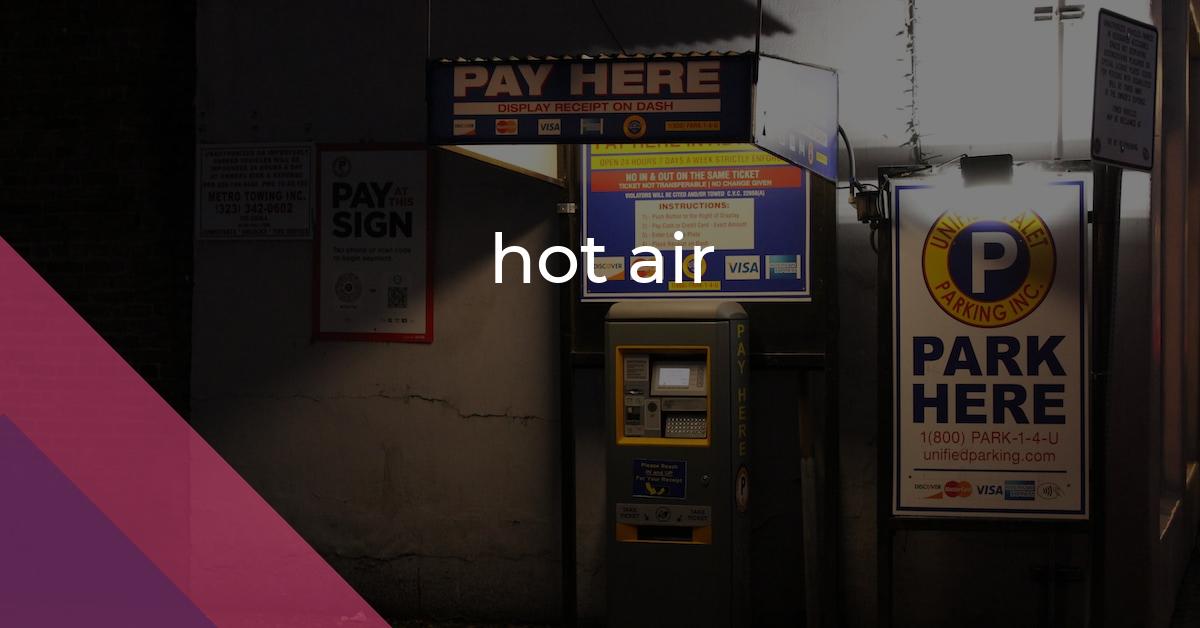hot air: Idiom Meaning and Origin
What does ‘hot air’ mean?
The idiom hot air means empty or meaningless talk or promises that have no substance or value.

Idiom Explorer
The idiom "thin air" refers to something that appears or disappears mysteriously or unexpectedly, as if it came out of nowhere. It can also describe a situation where there is no evidence or trace of something.
The idiom "into thin air" means to disappear or vanish suddenly and completely, without leaving any traces or evidence behind.
The idiom "hot and cold" means to be inconsistent or indecisive in one's actions or feelings.
The idiom "good for nothing" is used to describe someone or something that is completely useless or lacking in any value or purpose.
The idiom "get wind in one's jaws" means to talk excessively or for a long time about something, often without substance or relevance.
The idiom "full of it" means to be speaking insincerely or to be exaggerating or lying about something.
The idiom "full of hot air" means someone who talks a lot but doesn't say anything of substance or value. It refers to someone who is not trustworthy or reliable in their words or promises.
The idiom "for the birds" means something is worthless, unimportant, or not serious.
The idiom "for show" means doing something only to give the appearance of it, without any real substance or intention behind it.
Origins Unveiled: Decoding 'Hot Air'
The idiom "hot air" has several meanings and can be used in different contexts. One common definition of this idiom is when it is used to describe empty or meaningless talk.
In this sense, "hot air" refers to words or statements that sound impressive, important, or persuasive but lack substance or actual content. It implies that the talk or promises being made are unrealistic, exaggerated, or simply not backed up by any evidence or action.
Another interpretation of the idiom "hot air" is when it is used to describe a lot of talk or discussion about a particular topic that does not lead to any productive or meaningful outcome.
It implies that the talk is excessive without producing any tangible results or progress. This can be seen in various situations, such as political debates, negotiations, or even casual conversations where people engage in a lot of talking without reaching any resolution or conclusion.
The idiom "hot air" is often used to describe someone who is "full of hot air."
This means that they talk a lot but do not actually follow through on their promises or statements. It suggests that their words are empty and lacking substance.
Another related idiom is "thin air," which is used when something disappears or is impossible to find or explain. This is often used in the context of something appearing or disappearing suddenly without any trace or evidence.
For example, if someone says they saw a UFO and it disappeared into thin air, it means that it vanished without a trace or explanation.
The idiom "thin air" is similar to "hot air" in that it implies a lack of substance or evidence.
When someone's words or promises are described as "all hollow," it means that they are empty and lack any real meaning or value.
This is similar to the idiom "hot air" as it suggests that the talk is insubstantial and lacks substance.
Finally, the idiom "all sizzle and no steak" is used to describe something that promises to be exciting or impressive but ultimately fails to deliver on those promises.
It suggests that the talk or presentation is flashy and attention-grabbing, but there is no substance or actual value behind it.
The idiom "all sizzle and no steak" is similar to "hot air" as it implies that the words or promises being made do not match the reality or outcome.
Overall, these idioms are all related to the concept of empty or meaningless talk. They suggest that words or statements lack substance, evidence, or actual value. Whether it be someone who is "full of hot air," something that disappears into "thin air," talk that is "all hollow," or promises that are "all sizzle and no steak," these idioms serve as reminders that actions speak louder than words and substance is more important than rhetoric.
Example usage
Examples of how the idiom "hot air" can be used in a sentence:
- He is always full of hot air, making promises he never keeps.
- Don't listen to his speeches, it's just a lot of hot air.
- Her arguments were nothing but hot air, lacking any real substance.
More "Exaggeration" idioms



